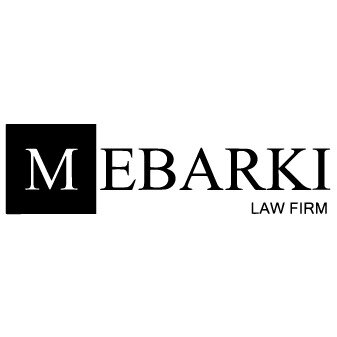Best Restructuring & Insolvency Lawyers in Algiers
Share your needs with us, get contacted by law firms.
Free. Takes 2 min.
List of the best lawyers in Algiers, Algeria
About Restructuring & Insolvency Law in Algiers, Algeria
Restructuring and insolvency law in Algiers, Algeria governs the legal processes that apply when businesses or individuals face serious financial difficulties. These legal frameworks help distressed companies restructure their debts, reorganize their business operations, or, when recovery is not possible, proceed through formal insolvency proceedings. The aim is to preserve economic value, protect creditors' rights, and, where appropriate, enable businesses to continue operating.
Algerian restructuring and insolvency law is influenced by both French legal tradition and local legislation, particularly the Algerian Commercial Code. Recent updates have sought to improve the efficiency and clarity of insolvency procedures, reflecting Algeria's ongoing efforts to enhance its business climate and legal infrastructure.
Why You May Need a Lawyer
Navigating restructuring or insolvency is complex and often involves high stakes for business owners, creditors, employees, and other stakeholders. Here are some common situations where legal assistance is crucial:
- Your company is unable to pay its debts as they become due.
- You need to negotiate with creditors to restructure debt or seek temporary relief from repayment obligations.
- You want to avoid personal liability as a director or shareholder during financial distress.
- You are considering voluntary liquidation or facing court-ordered insolvency proceedings.
- You are a creditor seeking to recover outstanding amounts from a debtor in financial distress.
- You need guidance on business rescue options and legal obligations regarding workforce and contracts.
- You require advice on asset protection, enforcement of security, or restructuring strategies in compliance with local law.
A lawyer with experience in Algerian restructuring and insolvency law can help you understand your options, comply with legal procedures, and protect your rights throughout the process.
Local Laws Overview
The legal framework governing restructuring and insolvency in Algiers, Algeria, is primarily found in the Algerian Commercial Code, including specific provisions for insolvency, bankruptcy, composition with creditors, and judicial liquidation. Key aspects include:
- Preventive Settlement (Concordat Préventif) - Companies in financial difficulty but not yet insolvent may seek a preventive settlement to restructure debts through court-approved agreements with creditors.
- Judicial Reorganization (Redressement Judiciaire) - This process aims to allow distressed companies to continue operations under close supervision while devising a recovery plan.
- Judicial Liquidation (Liquidation Judiciaire) - If reorganization is not possible, the court may order the liquidation and sale of assets to satisfy creditors.
- Insolvency Proceedings - Commenced upon the debtor's failure to pay debts, usually at the request of the debtor, a creditor, or the public prosecutor.
- Director and Shareholder Liability - Certain actions or omissions by company directors, such as wrongful trading or asset concealment, can lead to personal liability.
- Creditor Rights - The law divides creditors into secured and unsecured, with priority given to secured creditors during asset distribution.
- Court Supervision - Insolvency and restructuring procedures are closely supervised by the Commercial Courts sitting in Algiers, with appointed administrators or liquidators playing a key role.
- Recent Reforms - Algeria has begun modernizing insolvency legislation to align with international standards and facilitate business rescue.
Frequently Asked Questions
What is the difference between restructuring and insolvency in Algeria?
Restructuring involves reorganizing a company's finances or operations to overcome financial distress, often allowing it to continue doing business. Insolvency is the legal state where a company cannot meet its debt obligations, which may lead to formal proceedings such as liquidation.
When should a company consider filing for insolvency?
A company should consider filing for insolvency if it is unable to pay its debts as they become due and cannot reach voluntary settlements with creditors. Early action can provide more options for recovery or orderly winding-up.
Can an individual declare bankruptcy in Algeria?
In Algeria, insolvency laws primarily target commercial entities, but individuals operating businesses as sole traders may also be subject to certain insolvency procedures under the Commercial Code.
What happens to employees if a company enters insolvency?
Employee rights, such as wages and contractual entitlements, are given preference in the distribution of assets during insolvency. The fate of employment contracts depends on the specifics of reorganization or liquidation plans and court decisions.
How are creditors paid during insolvency proceedings?
Creditors are paid in order of priority established by law, with secured creditors and those with preferential claims (including employees) taking precedence. Unsecured creditors are paid after higher priority claims have been satisfied.
Are directors at risk of personal liability during insolvency?
Directors may face personal liability if they are found to have committed wrongful trading, fraud, or gross negligence leading up to insolvency. Legal advice is essential to understand and limit these risks.
Can restructuring be done out of court?
Yes, out-of-court settlements and private restructuring are possible through negotiations with creditors. However, court approval may be required to make such agreements binding on all parties.
How long do insolvency proceedings take in Algeria?
The duration of insolvency proceedings in Algeria varies widely based on case complexity, asset size, and court workload. Typically, proceedings may last from several months to a few years.
Can foreign creditors participate in Algerian insolvency proceedings?
Yes, foreign creditors may participate in Algerian insolvency proceedings, but must comply with local procedural rules and register their claims in a timely manner.
What are the signs that a company is heading toward insolvency?
Common signs include persistent cash flow problems, inability to meet payroll or supplier payments, mounting debts, and legal actions by creditors. Early recognition can help take preventive measures.
Additional Resources
If you need further information or support regarding restructuring and insolvency in Algiers, consider contacting the following resources:
- Algerian Ministry of Justice - Provides information about commercial courts and legal proceedings.
- Commercial Court of Algiers - Responsible for handling insolvency and commercial disputes.
- Chamber of Commerce and Industry (CCI Alger) - Offers guidance to businesses facing financial challenges.
- Licensed Insolvency Administrators - Professionals authorized by the courts to oversee restructuring and liquidation procedures.
- Local law firms specialized in bankruptcy and commercial law - Essential for tailored legal advice and representation.
Next Steps
If you are facing financial distress or believe restructuring or insolvency may be necessary, consider the following steps:
- Consult an experienced restructuring and insolvency lawyer in Algiers to assess your situation and identify the best legal options.
- Gather relevant financial documents, such as balance sheets, debt statements, and contracts, for legal review.
- Discuss potential informal arrangements with creditors or explore formal procedures, depending on your needs.
- Act promptly, as delays may limit your options and expose you to personal or business liability.
- Stay informed about your legal obligations and rights to make the best decisions for your business or personal financial future.
Seeking legal advice early can help you navigate the complexities of restructuring and insolvency, protect your interests, and facilitate a more favorable outcome in Algiers, Algeria.
Lawzana helps you find the best lawyers and law firms in Algiers through a curated and pre-screened list of qualified legal professionals. Our platform offers rankings and detailed profiles of attorneys and law firms, allowing you to compare based on practice areas, including Restructuring & Insolvency, experience, and client feedback.
Each profile includes a description of the firm's areas of practice, client reviews, team members and partners, year of establishment, spoken languages, office locations, contact information, social media presence, and any published articles or resources. Most firms on our platform speak English and are experienced in both local and international legal matters.
Get a quote from top-rated law firms in Algiers, Algeria — quickly, securely, and without unnecessary hassle.
Disclaimer:
The information provided on this page is for general informational purposes only and does not constitute legal advice. While we strive to ensure the accuracy and relevance of the content, legal information may change over time, and interpretations of the law can vary. You should always consult with a qualified legal professional for advice specific to your situation.
We disclaim all liability for actions taken or not taken based on the content of this page. If you believe any information is incorrect or outdated, please contact us, and we will review and update it where appropriate.











